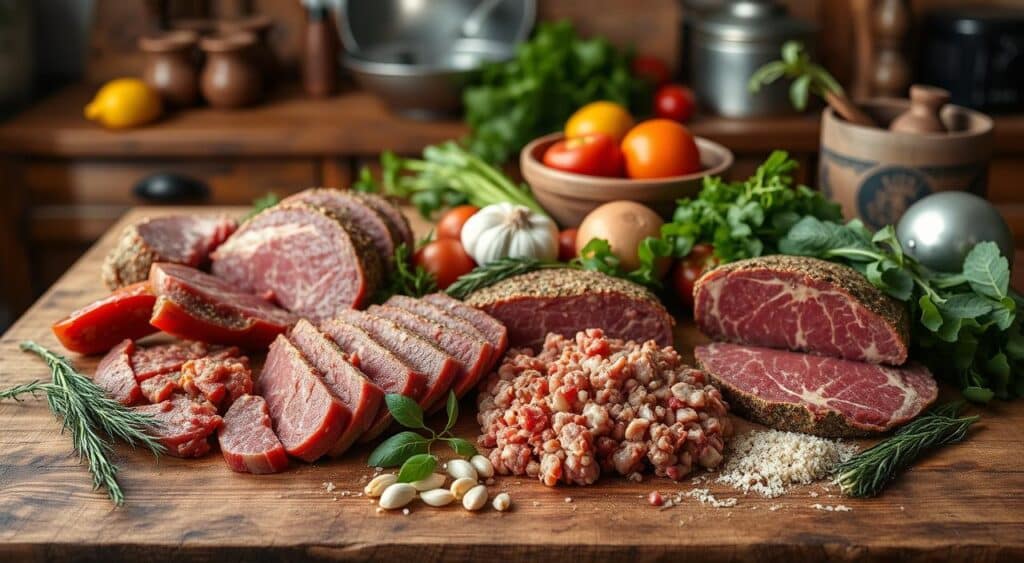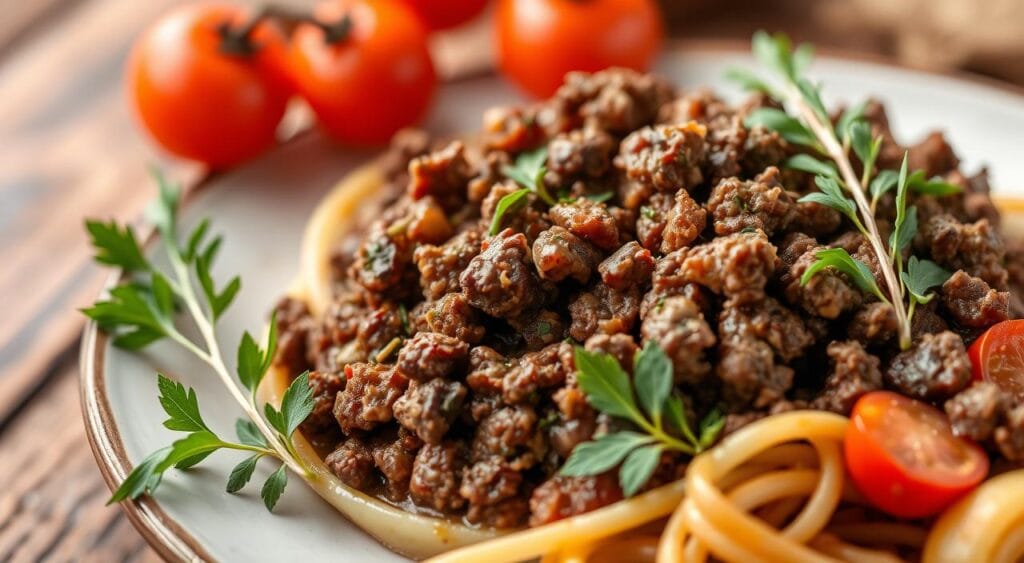Jump to:
Estimated reading time: 12 minutes
Table of contents
Is ground venison healthier than ground beef? More and more people are looking for leaner, healthier protein options. This has led to a big debate about ground venison and ground beef. Each meat has its own nutritional benefits, making it important to know the differences before adding them to your meals. This article will look at the nutritional comparison of ground venison and ground beef. We’ll explore their calorie and fat content, protein and amino acids, and vitamins and minerals.
Is ground venison healthier than ground beef? Key Takeaways
- Ground venison is generally lower in calories and fat compared to ground beef.
- Venison is a rich source of omega-3 fatty acids, offering cardiovascular benefits.
- Deer meat is high in essential vitamins and minerals like iron, zinc, and B vitamins.
- Ground beef provides a more affordable and accessible protein option for many consumers.
- Both meats have potential health drawbacks, such as cholesterol content and environmental impact.
Is ground venison healthier than ground beef? Introduction
More people are focusing on health, leading to a closer look at lean game meat like venison and traditional farmed meat. Ground venison, from wild deer, is seen as a better choice than ground beef. It offers health benefits for those looking to improve their diet. We’ll look at the differences between these meats, focusing on their nutrition and health effects.
Venison is a lean game meat with low fat and lots of nutrients. Ground beef, a farmed meat, has more fat and calories. Knowing the nutritional comparison of meats helps you choose the best for your health and taste.
“Venison is a fantastic source of lean protein, providing all the essential amino acids your body needs without the excess fat and calories found in many other red meats.”

Versatility and Accessibility
Venison is becoming more common, despite not being as easy to find as ground beef. It’s now available in many places, thanks to online stores and specialty shops. This makes it easier for health-focused shoppers to find.
- Venison is great for many recipes, thanks to its versatility.
- Ground beef, however, is still a favorite for many, offering a familiar taste in many dishes.
When comparing meats, think about health, but also how easy they are to find and use. This ensures a balanced and sustainable diet.
Nutritional Comparison of Ground Venison and Ground Beef
Ground venison and ground beef have different nutritional profiles. Venison, from deer, has fewer calories and less fat than beef. It also has more B vitamins and iron.
Calories and Fat Content
A 4-ounce serving of ground venison has about 190 calories and 10 grams of fat. Ground beef, the same size, has 290 calories and 23 grams of fat. Venison is better for those watching their calories or wanting to stay healthy.
Protein and Amino Acids
Both venison and beef are great for protein. A 4-ounce serving of venison has 28 grams of protein. Beef has about 24 grams. They both have all the essential amino acids.
Vitamins and Minerals
- Venison has more B vitamins, especially vitamin B12, which is key for blood cells and brain function.
- Venison also has more iron, which carries oxygen and boosts the immune system.
- Beef, however, has more zinc. Zinc helps with healing, immune function, and making proteins.
| Nutrient | Ground Venison (4 oz) | Ground Beef (4 oz) |
|---|---|---|
| Calories | 190 | 290 |
| Total Fat | 10 g | 23 g |
| Protein | 28 g | 24 g |
| Vitamin B12 | 2.4 μg | 2.1 μg |
| Iron | 3.7 mg | 2.4 mg |
| Zinc | 4.4 mg | 5.8 mg |
Knowing the nutritional differences between ground venison and ground beef helps you choose the right protein for your diet and health goals.

Health Benefits of Ground Venison
Ground venison is a top choice for those looking for a lean protein. It has fewer calories and fats than ground beef. This makes it a better option for a healthy diet.
Lower Fat and Calories
Ground venison has less fat and calories than ground beef. It’s a lean meat with less saturated fat and calories. This is great for those trying to lose weight or stay healthy.
High in Omega-3 Fatty Acids
Ground venison is rich in omega-3 fatty acids. These acids are good for your heart and brain. Eating deer meat can help you get more of these important nutrients.
Rich in Essential Nutrients
Ground venison is also full of vitamins and minerals. It’s a good source of B vitamins, iron, and zinc. These nutrients are key for staying healthy. Choosing ground venison means you’re getting a protein that’s full of nutrients.
“Venison is a fantastic alternative to ground beef, offering a healthier, more sustainable, and delicious protein option.”
Potential Health Drawbacks of Ground Venison
Ground venison has many health benefits, but it also has some downsides. One issue is its higher cholesterol levels compared to beef. This might be a problem for people with health conditions that affect cholesterol.
Another drawback is its “gamey” taste. Some people find this taste less appealing than beef’s milder flavor. This can be a turn-off for those who prefer the taste of beef.
It’s also important to think about the environmental and ethical aspects of hunting venison. The wild meat vs farmed debate highlights the sustainability and ethics of getting venison versus beef. Beef is more widely available and regulated.
| Health Consideration | Ground Venison | Ground Beef |
|---|---|---|
| Cholesterol Content | Higher | Lower |
| Flavor Profile | Gamey Taste | Familiar Beef Flavor |
| Environmental Impact | Wild Hunting | Commercially Raised |
Choosing between is ground venison healthier than ground beef? depends on more than just nutrition. It’s also about personal taste and lifestyle. Venison might have some potential health drawbacks of venison, but it can still be a healthier choice for those open to trying wild meat.
Health Benefits of Ground Beef
Ground venison might be leaner, but ground beef has its own health perks. It’s packed with iron and zinc. These minerals are key for our bodies to function well.
Rich in Iron and Zinc
Ground beef is a top source of iron. Iron helps carry oxygen in our blood. It’s also rich in zinc, which boosts our immune system and helps with healing and making proteins.
Affordable and Accessible Protein Source
Ground beef is easy to find and won’t break the bank. It’s a great protein source for many families. Compared to ground venison, it’s more affordable and accessible.
Versatility in Cooking
Ground beef is super versatile in the kitchen. It can be used in burgers, meatballs, chili, and more. This makes it easy to find a dish that everyone will enjoy.
Even though ground venison is healthier, ground beef has its own benefits. It’s a great choice for a balanced diet.
Potential Health Drawbacks of Ground Beef
Ground beef has many good points, but it also has some downsides. One big issue is its saturated fat content. Too much saturated fat can raise your cholesterol and harm your heart. Also, the use of hormones and antibiotics in beef farming is a worry for many.
The environmental impact of beef is another concern. Beef farming can pollute the air and use a lot of resources. This is something some people think about when they choose between ground venison and ground beef.
Ground beef does have nutritional benefits, but we should also think about its risks. If you’re wondering if ground venison is better, you might find it’s a healthier choice. It could also be better for the planet.
Environmental and Ethical Considerations of Ground Venison vs. Ground Beef
Beyond the nutritional aspects, another factor worth exploring is the environmental and ethical implications of consuming ground venison compared to ground beef. With increasing awareness of the environmental impact of livestock farming, many people are looking for more sustainable and ethical meat options. In this context, venison, particularly from wild or responsibly managed sources, can be a more environmentally friendly and ethically conscious choice.
Environmental Impact of Ground Venison
The environmental footprint of ground venison is generally lower compared to ground beef, especially when the venison is sourced from wild game. Wild deer naturally consume their diet of grass, leaves, and shrubs without the need for agricultural inputs like grains, soy, or corn, which are commonly used in cattle feedlots. This means that venison production does not require the same level of land, water, and fertilizer use as beef production does.
Additionally, wild venison does not contribute to the same greenhouse gas emissions associated with industrial cattle farming. Cows produce significant amounts of methane, a potent greenhouse gas, as part of their digestive process. Deer, on the other hand, have a different digestive system and produce less methane. Therefore, hunting or harvesting venison from wild populations can be seen as a more sustainable way to obtain meat.
Impact on Biodiversity and Ecosystems
The consumption of ground venison can also play a role in managing local ecosystems. In many regions, deer populations are managed through regulated hunting to prevent overpopulation, which can lead to issues like overgrazing, habitat destruction, and conflicts with human populations. By consuming venison, individuals are supporting wildlife management efforts that help maintain balanced ecosystems.
In contrast, large-scale beef production often involves clearing land for pasture or feed crops, which can lead to deforestation, loss of biodiversity, and degradation of ecosystems. The intensive use of resources like water and the need for antibiotics and hormones in some beef production systems also pose significant environmental challenges.
Ethical Considerations
From an ethical standpoint, ground venison, particularly from wild game, presents a different set of considerations compared to ground beef. Hunting for venison is often regulated and done in a way that ensures the humane and ethical treatment of animals, often within the framework of conservation and wildlife management. The animals live in their natural habitats until they are harvested, which can be seen as more ethical compared to the conditions some cattle experience in industrial farming operations.
On the other hand, the beef industry has faced criticism for practices like confined animal feeding operations (CAFOs), where animals are kept in crowded and often stressful conditions. Issues such as the use of growth hormones, antibiotics, and the environmental impact of waste runoff are concerns that many consumers consider when making ethical food choices.
Sourcing and Traceability
The traceability of ground venison is another factor that appeals to conscious consumers. When buying venison from local hunters or small-scale suppliers, there is often a clear understanding of where and how the meat was sourced. This transparency can provide peace of mind regarding the quality and sustainability of the meat.
Conversely, the traceability of ground beef can be more complex. Beef in grocery stores may come from multiple sources, and the conditions under which it was raised can vary significantly. Consumers concerned about the ethics and sustainability of their meat choices may prefer venison for its more transparent and localized supply chain.
Economic Considerations
While ground venison is often viewed as a more sustainable and ethical choice, it’s also important to consider the economic aspects. Ground venison can be more expensive and less widely available than ground beef, which may limit its accessibility for some consumers. However, for those who hunt or have access to local game processors, venison can be a cost-effective and nutritious alternative to store-bought beef.
In contrast, ground beef is widely available and often cheaper, making it a more convenient option for many families. The affordability and availability of beef make it a staple in many households, but the hidden environmental and ethical costs are factors that more people are considering in their purchasing decisions.
Frequently Asked Questions: Is ground venison healthier than ground beef?
Is ground venison healthier than ground beef?
Yes, ground venison is generally healthier than ground beef. It is leaner, with fewer calories and less saturated fat, while still providing high levels of protein, iron, and B vitamins. This makes it a nutritious choice for those looking for a lean red meat.
How does ground venison compare to ground beef in fat content?
Ground venison typically has about 50-60% less fat than ground beef, especially if using lean cuts. This lower fat content makes venison a great option for those aiming to reduce fat intake.
Does ground venison have more protein than ground beef?
Both meats are high in protein, but venison is slightly higher per ounce. Venison’s high protein and low-fat profile can help with muscle building and repair without the extra calories from fat.
Are there any vitamins and minerals in venison that make it healthier?
Venison is rich in essential nutrients like iron, zinc, and B vitamins, particularly vitamin B12, which supports energy and immune health. It’s also typically free from antibiotics and hormones, which some prefer for health reasons.
Is venison better for weight management than beef?
Yes, venison’s lower fat and calorie content make it beneficial for weight management. Since it’s high in protein and low in saturated fat, venison helps keep you fuller longer without adding extra calories.
Conclusion
Choosing between ground venison and ground beef depends on your health goals and what you like to eat. Ground venison is leaner, with fewer calories and less fat. It also has more nutrients that are good for you.
But, ground beef is also nutritious and might be easier to find and cheaper. It’s important to think about what you need and want when deciding.
Ground venison and ground beef can both be good for you if eaten in the right amounts. They both offer benefits for a healthy diet. It’s all about what you prefer and what fits your lifestyle.
Knowing the differences in meat can help you choose what’s best for you. This way, you can support your health and wellness goals.






